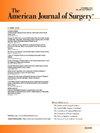治愈性结肠癌手术后血清VEGF浓度与复发:来自多中心前瞻性队列研究的结果
IF 2.7
3区 医学
Q1 SURGERY
引用次数: 0
摘要
血管内皮生长因子(VEGF)是肿瘤进展的关键调控因子。先前的一项单中心研究发现,术后第4天(POD4) VEGF >;370 pg/mL是结肠癌(CC)复发的预测因子。方法:我们进行了一项前瞻性研究,包括来自7家西班牙机构(NTC04851054)的255名接受治愈意图CC手术的患者。采用ELISA法检测POD4的血清VEGF水平。结果中位随访34个月后,15.7%的患者复发。先前提出的VEGF阻断未得到验证。VEGF在复发和未复发患者之间无显著差异。然而,较高的VEGF水平与开放手术(p = 0.013)和术后并发症(p < 0.001)相关,并有吻合口漏的趋势(p = 0.062)。结论vegf不能预测这种情况下的复发,但仍是围手术期血管生成活性的相关标志物,值得进一步研究。本文章由计算机程序翻译,如有差异,请以英文原文为准。
Postoperative serum VEGF concentration and recurrence after curative colon cancer surgery: findings from a multicenter prospective cohort
Background
Angiogenesis is essential for tumor progression, with vascular endothelial growth factor (VEGF) as a key regulator. A prior single-center study identified VEGF >370 pg/mL on postoperative day 4 (POD4) as a predictor of recurrence in colon cancer (CC).
Methods
We conducted a prospective study including 255 patients undergoing curative-intent CC surgery across seven Spanish institutions (NTC04851054). Serum VEGF was measured via ELISA on POD4.
Results
After a median follow-up of 34 months, recurrence occurred in 15.7 % of patients. The previously proposed VEGF cutoff was not validated. No significant differences in VEGF were observed between patients with and without recurrence. However, higher VEGF levels were associated with open surgery (p = 0.013) and postoperative complications (p < 0.001), with a trend in anastomotic leakage (p = 0.062).
Conclusions
VEGF was not predictive of recurrence in this setting but remains a relevant marker of perioperative angiogenic activity, warranting further investigation.
求助全文
通过发布文献求助,成功后即可免费获取论文全文。
去求助
来源期刊
CiteScore
5.00
自引率
6.70%
发文量
570
审稿时长
56 days
期刊介绍:
The American Journal of Surgery® is a peer-reviewed journal designed for the general surgeon who performs abdominal, cancer, vascular, head and neck, breast, colorectal, and other forms of surgery. AJS is the official journal of 7 major surgical societies* and publishes their official papers as well as independently submitted clinical studies, editorials, reviews, brief reports, correspondence and book reviews.

 求助内容:
求助内容: 应助结果提醒方式:
应助结果提醒方式:


